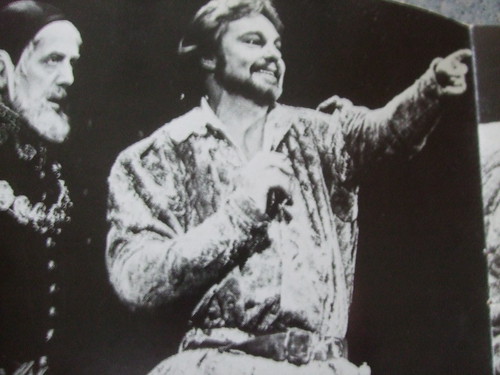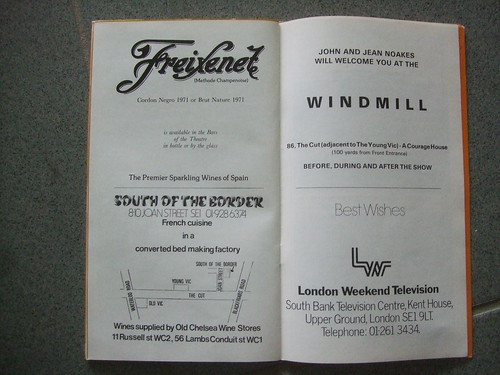
Hamlet played by Derek Jacobi.
Directed by Toby Robertson.
I’m signed up to the local Freecycle service and a couple of years ago someone was giving away bags and bags of old theatre programmes and posters. I had thought before visiting that they would be for the local area but they turned out to be from the West End and outer London and to my great pleasure for this legendary Old Vic production of Hamlet with Derek Jacobi originated in 1977/8, put on tape in 1979 and released by Argo on cassette a couple of years later.
The programme itself is a treat, but you can see that for yourself because I’ve uploaded photos of the pages to flickr (albeit using my rubbish digital camera). There’s a celebratory feel, perhaps because this was seen as a triumphant return, with photographs of Hamlets from previous Old Vic productions stretching as far back as Ernest Milton in 1921 and a history of the theatre itself. The advertising too offers a microcosm of the life of theatre-goers in that period:

As with the recording of the RSC production with Tennant, reading the programme beforehand certainly put me in the right mood, helped by the fact that as with many of the programmes she gave me, the previous owner has written a short review of the show in the back along with a note about the audience. This was a return appearance after an international tour and her words suggest that some elements had changed in the meantime:
30th Jan 78Reading these contemporary professional reviews and the account from the book Modern Hamlets and their soliloquises reveals that the show had a messy stage history, beginning as a truncated version (the programme suggests the Folio text with cuts suggested by the first Quarto) with a much praised Ophelia in Suzanne Bertish and a clear indication that she and Hamlet were very much having a sexual relationship – it’s this version that Kenneth Branagh saw and convinced him that theatre was the life for him.
Performance dulled a little. Jacobi not quite as carefree (colourful?). Directorial difference only. Humour more masked. Ophelia back to traditional portrayal. Wymark the besotted girl, as opposed to Bertish the sophisticate. Not so interesting. Bertish added extra level to the play. […] Audience were more responsive. Picking up all the humour quickly. Small house but a relaxed audience.
A few months later the production, retaining most of the same cast, was extended to a fuller length (reinstating amongst other things “How all occasions” according to director Tony Robertson), with Jane Wymark, who appears in this audio version, replacing Bertish and offering a much more subdued, chased version. My donor was obviously keen to compare and contrast and obviously preferred the earlier production which seems to be the reverse of the audience she was sitting with! Without a point of comparison I will at least propose that Wymark’s Ophelia is a bit traditional but not bland.
What is notable is how physical this audio production is. Though this obviously can't be a complete replication of the stage production, what we have here is a well rehearsed cast giving a performance rather than simply rehearse/reading from a script which often happens with audio productions. Care has been taken to place the characters within a definite space, with some scenes conducted some way from the microphone forcing them to offer theatrical projection making this a very visceral listen. Only during the soliloquies do the actors take advantage of the intimacy reducing their timbre of their voices to a whisper.
Perhaps its because of that Jacobi is a more passionate Hamlet than the man he became in the later 1980 BBC Shakespeare production, his voice shifting constantly between octaves as if to indicate the frequency of his madness (for he doesn't just fein madness, he nudges off the cliff) through sound alone. After discovering the reality of his father’s death, he offers a gutteral scream which made my tape player tremble and one can only imagine the physical power he must have had on stage. His Hamlet bawls as he drags away the guts of Polonius, well aware that his moral code is broken and that he's now no better than the man he despises.
Only in the late scenes, when Hamlet knows the moment has passed and there's little he can do does Jacobi rightly sober up, as if to indicate that he understands that he can no longer fight against the inevitable, “The readiness is all”. But by then the rest of the cast have shifted up a gear to join him. Timothy West’s Claudius (which is new to this audio replacing John Turner) is an impatient, irascible figure unable to keep his true emotions from cracking through the surface. If his treatment of Gertrude after the death of Polonius is any indication he must be horrible company.
Frequently with productions, especially on audio, a fatigue sets in during the latter stages, especially if I’m listening in one session, which is usual. Not so here. Even as Hamlet began to describe his relationship to Yorrick I began to question what I was hearing and for the first time I noticed – Horatio knows about the effect Polonius’s death has had on Ophelia – it is he who convinced Gertrude to meet Ophelia -- but has he told Hamlet? The Danish prince’s good, if melancholic humour just before the funeral suggests not, in which case, why now? I asked Metafilter and along with some of the criticism I've subsequently looked at, no one seems to have a definitive answer.
Also keeping my interest in these late stages are Laertes’s proper mob, the room suddenly filling with dozens of voices which is rare. Barbara Jefford’s regal Gertrude who appears to tell Hamlet what he needs to hear but breaks down just after he leaves her. And the other casting interests which include Trevor Martin as the Norwegian Captain, the older version of whom I saw in As You Like It at the Globe last year and one Oz Clarke, future wine critic, then actor, offering a rather good aristocratic Oscric neatly holding his own against Jacobi's sarcastic wit.
Given the historical elements of the programme there is one other notable moment. As I intimated, much of the play betrays the influence of the method and despite its age, none of these performances would be out of place now. Except for during The Mousetrap, when both actors revert to the style of an earlier age (which I’ve previous heard in the Paul Scofield starring version) of the emotional trill as if to demonstrate how far they’ve come. This proved to be an influential production (full story), and perhaps part of that is because it already understood its place within theatrical history.
No comments:
Post a Comment